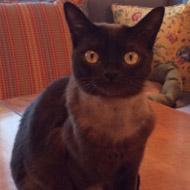
Vets and human cardiologists unite to perform surgery
Human cardiologists and vets have joined forces to perform extremely rare heart surgery on a cat.
Led by UC Davis vet Dr Josh Stern, a team of five human doctors carried out the surgery on a one-year-old female Burmese cat.
Vanilla Bean was suffering from a rare congenital heart defect that did not allow blood to flow properly through the chambers. This improper flow can cause too much blood to collect in one chamber, create pressure, enlarge it, and ultimately lead to congestive heart failure.
A procedure to correct the defect had only been reported once before by Dr Stern.
“I needed a human cardiology team to help guide me on this case, as well,” said Dr Stern. “It’s so uncommon in cats. It’s uncommon in children also, but they’ve certainly seen more cases of this than I have.”
Together, Dr Stern and the doctors opened Vanilla Bean's chest and positioned catheters and balloons within her heart.
The technique is extremely uncommon in veterinary medicine and even more rarely employed in cats due to their small size.
The surgery was a success, but not without complication - Vanilla Bean suffered a lot of blood loss and needed several transfusions.
Blood loss also caused Vanilla Bean to suffer an acute kidney injury, and the surgeons were concerned she would die of kidney failure. Luckily, this was not the case.
Four months have now passed since the surgery and Vanilla Bean is no longer in congestive heart failure and has been taken off all medications. Dr Stern expects her to make a full recovery.



 The Veterinary Medicines Directorate (VMD) is inviting applications from veterinary students to attend a one-week extramural studies (EMS) placement in July 2026.
The Veterinary Medicines Directorate (VMD) is inviting applications from veterinary students to attend a one-week extramural studies (EMS) placement in July 2026.